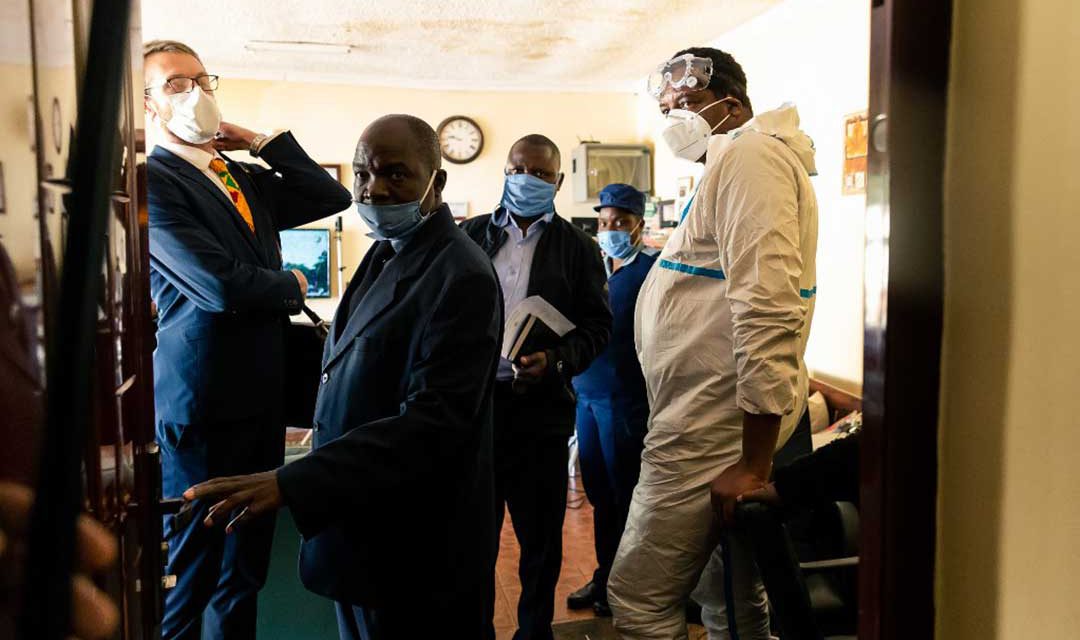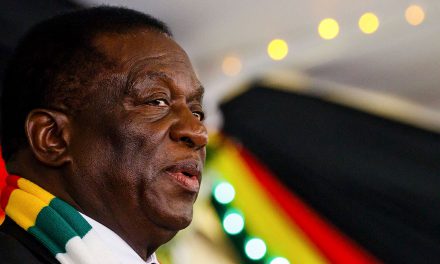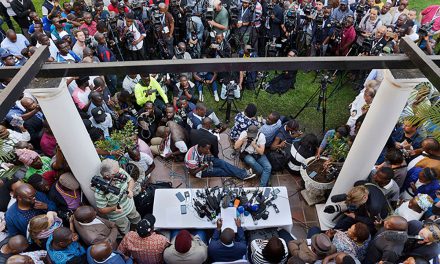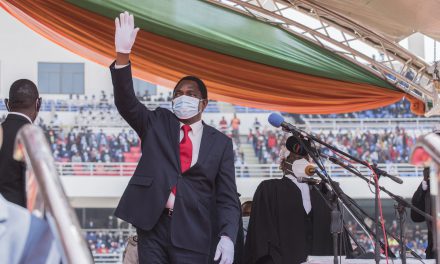Working for privately-owned media in Zimbabwe means consciously facing serious risks
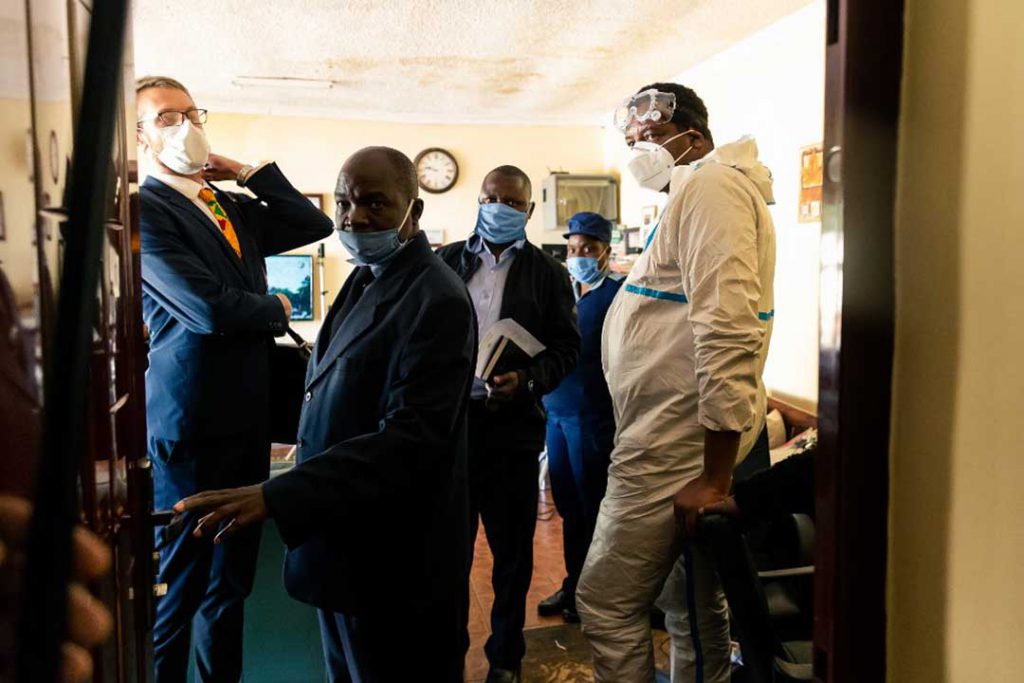
Zimbabwean journalist and documentary filmmaker Hopewell Chin’ono (R) watches while police csearch of his offices in Harare on July 21, 2020, a day after he was arrested and charged with incitement to commit public violence. Chin’ono and opposition politician Jacob Ngarivhume were the latest among several of President Emmerson Mnangagwa’s critics to be arrested or have their homes raided and searched ahead of protests planned for July 31, 2020. He has been denied bail twice. (Photo by Jekesai NJIKIZANA / AFP)
The term “fourth estate” to describe the press is generally attributed to British MP Lord Thomas Macaulay, who is said to have used it in reference to members of the press seated in the House of Commons gallery in 1828. The media was seen as the necessary additional element of democracy that would serve as a watchdog of the other three arms of government. Since then, this characterisation of the media has had profound significance in understanding the role and place of the media in modern society. This thinking is summed up in an op-ed piece by former Zimbabwe Independent editor Dumisani Muleya, first published on the newspaper’s website and allegedly retracted on instruction of the owner of Alpha Media Holdings (AMH) on 4 October, 2019. The piece was later republished by ZimLive, an online media entity: “The main objective of journalism should be serving the public interest. It should never be prostituted for self-serving ends, be they political or commercial interests; or indeed the whims of publishers, editors’ caprices and readers’ worst instincts.”
It is only by serving this objective that the media can fulfil its role as the fourth estate, as an important element of democracy. Hence, the arguments for a free press. This philosophy has largely informed the development and role of the private media in Zimbabwe, thus putting them at loggerheads with the ruling party, ZANU-PF, and its government. The private media in Zimbabwe have experienced various forms of state harassment and repression. Journalists have been tortured, disappeared, arrested, detained without charges, brutally beaten. Pressrooms have been bombed and teargassed. Since everyone knows this, working for privately-owned media in this country means consciously facing serious risks. Over the years, the state’s muzzling of privately-owned media has seen a number of particular low points. There was the torture of Ray Choto and Mark Chavunduka – journalist and editor of the Standard, respectively – by the army in 1999 for reporting a foiled coup. The Harare-based Daily News was bombed twice, on 22 April, 2000 and 28 January, 2001, before it was closed under the controversial Access to Information and Protection of Privacy Act (AIPPA) in 2002.
Andrew Meldrum, a correspondent for The Economist and The Guardian in Zimbabwe, was arrested in 2002 and forcibly deported in 2003. This was followed by a ban on foreign media houses in the country. And then there was the disappearance on 9 March, 2015 of Itai Dzamara, a freelance journalist and outspoken critic of Zimbabwe’s then president, Robert Mugabe. More recently, the Reporters without Borders 2020 Press Freedom Rankings puts Zimbabwe at 126 out of 181 countries. In his 2012 book, The Dictator’s Learning Curve: Inside the Global Battle for Democracy, William Dobson argues that authoritarian regimes around the world are growing more sophisticated. They understand that “ the more brutal forms of intimidations – mass arrests, firing squads, and violent crackdowns” are counterproductive, and “best replaced with more subtle forms of coercion”. Modern authoritarians, he continues, understand the importance of appearances, which is why they “pepper their speeches with references to liberty, justice and the rule of law”. The result is that “from a distance, many of the world’s leading authoritarians look almost democratic”. Zimbabwe’s small ruling elite has, apparently, learned some lessons as regards the ways it seeks to control the media.
The process began with the government of national unity (2009/2010), and intensified during the period leading to the rise of Emmerson Mnangagwa to Zimbabwe’s presidency. Mnangagwa was initially labelled a reformist and someone who understood the needs of business, perceptions he capitalised on to consolidate his power base. As Dobson argues, “many features of a modern authoritarian regime are individually not at odds with a healthy democracy”. For instance, an official inquiry into the state of the media industry in 2014 made far-reaching recommendations that suggested the possibility of media reforms, but the report simply gathered dust. A number of new radio stations have been licensed, but these are linked to state-owned media or individuals loyal to the ruling party. Recently, applications for broadcasting rights for commercial television, community radio stations and campus radio stations were invited, but applications were attached to steep licensing fees. By falling for the regime’s narrative, Zimbabwe’s privately-owned media have fallen into a Charybdis – the monster/whirlpool of Greek mythology.
The political interests of the ruling elites and the business interests of the publishers have found common ground, argues Dr Pedzisai Ruhanya, a University of Johannesburg Media and Democracy Scholar, in a 2018 article, ‘The Plight of the Private Press During the Zimbabwe Crisis (2010-2018)’. Another writer, Tatenda Prosper Chitagu agrees. In a 2018 study of the relationship between Zimbabwe’s private media and the ruling party, Chitagu argued that coverage by two privately owned papers of the recent power struggles within Zanu-PF “mirrored a society on the edge”. The papers had “fixated … on infighting within Zanu-PF”, which narrowed their coverage of others issues. Meanwhile, allegations of brown envelope journalism have become more insistent and widespread as journalists have had to endure poor working conditions and increased workloads. They have also had to deal with pay cuts, sometimes going for months without salaries. The country’s weak economy has hit publishers and media house owners; dwindling corporate advertising revenues have left government and parastatals as the major source of income, which appear to have taken advantage of the situation to buy the acquiescence, or silence, of private media.
As an example, Muleya’s controversial exit from the editorship of the Zimbabwe Independent in October 2019 raised a heated debate about the present condition of the private media in Zimbabwe – and its future. It is widely believed that Trevor Ncube, the owner of Alpha Media Holdings (AMH), the publisher of the Zimbabwe Independent, had to change editors critical of the Mnangagwa administration after reconciling his stance towards the government after the fall of Mugabe. Social media reports claim that Mnangagwa bought a 30% stake in AMH for $2 million via his son in-law, Gerald Mlotshwa. These claims were further given currency by a photo of Ncube and Faith Zaba (the newly appointed editor of the Zimbabwe Independent) handing Mnangagwa a framed Newsday headline about the then-impending coup during November 2017: Mugabe Out in Weeks – Claims Mnangagwa. However, Prudence Mutsvanga, the company secretary of AMH, rejected the claims in a public statement in October last year, denying that Mnangagwa or anyone representing him had been in “negotiations” with AMH. Similar claims have also been made regarding the purchase and merger of Associated Newspapers of Zimbabwe (ANZ), publishers of the Daily News, with Modus Publications, publishers of the Financial Gazette, into one media stable in 2017.
It is believed that former Reserve Bank governor Gideon Gono sold his ANZ shareholding to Mlotshwa. This change in shareholding saw a change in editorial structure and the elevation of journalists perceived as friendly to the Mnangagwa administration. However, the shareholding structures of Zimbabwean media operations are murky terrain, meaning that financial journalists and commentators often rely on rumour and off-the-record information. As Ruhanya comments in the article cited earlier, “[The] [s]hareholdings and ownership structures of newspapers are not always transparent”. But the buying-off of critical private media is not new in Zimbabwe. In 2005 the Irish Times reported that Zimbabwe’s intelligence organisation, the Central Intelligence Agency (CIO), had secretly invested in the Financial Gazette, the Daily Mirror and Sunday Mirror. However, there are indications of a growing and active online community, as reported by Zimbabwe’s Postal and Telecommunications Authority in 2016 and the National Statistics Agency (ZIMSTAT) in 2014. Active mobile phone penetration was at 13 million subscribers, or around 97% of the population, according to the ZIMSTAT report.
Internet subscriptions were at 6,7 million, or about 50.1% of the population. Some 37% of data use in Zimbabwe was spent on WhatsApp and Facebook, while some $167 million was spent on calls, data and internet during the same period. This has seen the rise and exponential growth of new media operations such as Bus Stop TV, Magamba TV, CITE, Big Saturday Read, Gravitas Bulletin, Comic Pastor and @263 Chat, among others. These media have helped to keep power accountable by reporting on corruption in the public sector and other issues of public interest. Magamba TV, Bus Stop TV and Comic Pastor have become known for using political satire to stimulate discourse on so-called hot topics. Gravitas Bulletin and Big Saturday Read, through op-eds, have stretched the limits of traditional media in discussing public affairs. CITE, meanwhile, has managed to use online documentaries to give voice to the victims of the 1980s genocide in Matabeleland who previously had been unheard. However, Zimbabwe’s worsening economic crisis has seen rising data costs and depleted incomes, meaning that citizens have less to spend on communications.
Moreover, the ruling party has come up with strategies aimed at muzzling and muting online debate. Speaking in Shona at a ZANU-PF youth meeting during the July 2018 election campaign, Mnangagwa instructed the youth league: “Tambai navo muSocial Media imomo. Musakundwe muSocial Media. Pindai, morakasha vanhu muSocial Media”. (Loosely translated as “Go and engage with them on social media. Make sure you defeat and destroy our opponents on social media.”) This saw the christening of ZANUPF’s new online army, known as the Varakashi (the destroyers), whose purpose appears to be to cyberbully or harass government critics into silence. “Civil society leaders, opposition activists, independent media and even foreign embassies have been the subject of targeted online campaigns laced with vitriolic language,” according to a 2019 article on the Global Voices site, an online community of journalists, translators, academics and human rights activists. The attacks involve “a mix of fake news, rumour, hate speech, disinformation and misinformation” in a bid to discredit alternative voices, according to the article.
A case in point is that of comedian Samantha (Gonyeti) Kureya of Bus Stop TV, who was reportedly abducted by unidentified armed men, stripped, beaten and forced to drink sewerage in August last year. She later told reporters that her attackers warned her about mocking the government in her skits. A junior government minister, however, tweeted that Kureya had faked the abduction to obtain donor funding. As Global Voices points out, “mis- and disinformation” are able to flourish due to a variety of factors: extreme polarisation in the media, proposed government controls over social media, poor official communication methods and low digital literacy among internet users”. The Varakashi have sometimes gone further than merely attacking bloggers. A case in point was their attempt to cyberbully Dr Alex Magaisa, a law lecturer based at Kent University in the UK and publisher of the Big Saturday Read, a popular critical blog on public affairs in Zimbabwe. A pro-government social media troll, @CdeNMaswerasei (Cde Never Maswerasei), launched a petition on change.org imploring Kent University to break ties with Magaisa.
Other techniques, used on Twitter and Facebook, are to energetically post items on unrelated subjects or spam chat threads. A recent fallout, in January 2020, between presidential spokesperson George Charamba and a supposed Varakashi, Kudzai Mutisi, tweeting as @ KMutisi, has inadvertently given credence to the thesis that the government pays online social media trolls. Charamba chastised Mutisi for failing to toe the official line and said he was holding to ridicule “the very system that pays [him]”. This raised eyebrows: a senior member of the government was admitting that it paid trolls to defend the party. Given this, we might question the ability of the Zimbabwean media to play their role as the fourth estate in the interest of the public and of democracy. There are a number of questions that arise: how can the media be supported in complex environments such as Zimbabwe? What opportunities do new digital media offer and how can they be consolidated? How do you address issues of access to online media, given rising data costs and depleting incomes? What kind of journalism is required in the current environment, and what capacity building strategies are needed? And how should the problem of emerging media monopolies, particularly in Africa, be addressed?
For Hopewell Chin’ono’s Africa in Fact article on media in Zimbabwe click here.
For more on the perils of journalism in Africa, click here.
For more on media freedom in Africa click here.
[pdf-embedder url=”https://digitalmallblobstorage.blob.core.windows.net/wp-content/2020/08/UN-PLAN-OF-ACTION.pdf” title=”UN PLAN OF ACTION”]
Tamuka Charles Chirimambowa is co-founder and editor of Gravitas Bulletin. He is currently studying for DLitt. et. Philosophy in Development Studies at the University of Johannesburg. Tamuka has worked extensively with civil society in Zimbabwe and South Africa, on issues of human rights, governance and democracy, migrant’s rights, economic policy and social justice. He is keenly interested in the socio-political and economic transformation of post-colonial African societies.

